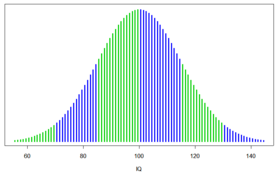IQ: The Intelligence Question
The IQ test is often seen as the paramount assessment of intellect- but how accurate are they?

A chart of the range of IQ test scores.
January 10, 2021
When we think of intelligence, what do we think of? One of the first things that comes to mind might be the IQ test, IQ standing for intelligence quotient. Created in France in the early 20th century, it was designed to find which students would excel in school and which wouldn’t. The result? A daunting standardized test that attempts to represent cognitive information by compressing it into a simple numerical score. Despite the confidence our culture has in the IQ test, trusting its results just isn’t logical.
One of the largest failures of the IQ test is that it is unable to assess all aspects of someone’s intelligence. Though the tests are used to find those who need extra help in school and those who are “gifted,” as well as for governmental hiring protocols and university admissions, according to The Atlantic IQ tests simply can’t analyze emotional intelligence, creativity, or practical intelligence, commonly known as “street smarts.” The only thing an IQ test can measure is academic intelligence, including fluid reasoning, knowledge, quantitative reasoning, visual-spatial processing, and working memory. Emotional intelligence, says PositivePsychology.com, is a person’s ability to take in, process, and manage emotional information. An emotionally intelligent person will have the important skills of self-awareness, empathy, motivation, social skills, and self-regulation. Having emotional intelligence can lead to much more success than simply possessing academic intelligence. Bemorewithless says that creativity is another way to problem solve which is completely different from those measured by traditional IQ tests. Being “street smart” opens up a whole new world of intelligence- a world “book smarts” can’t access. IQ tests just don’t tell you the full spectrum of your intelligence, and to be an accurate representation of someone’s mind it has to tell all.
Studies have proven time and time again that the IQ test is ineffective in evaluating a person’s entire intelligence. CBS News cites a study by a Dr. Adrian Owen. Dr. Owen found that cognitive ability cannot be fully measured in any single test. The study had 100,000 participants take a series of 12 tests that measured reasoning, attention, planning abilities, and memory. The tests proved unable to accurately measure a person’s entire intelligence. Instead, Dr. Owen found that a person’s “cognitive profile” is made up of many different aspects, such as reasoning, short-term memory, and verbal ability. Furthermore, the Independent cites a study which showed that there are too many differences in peoples’ mental capacities for one test to fit them all. Thus, an IQ test, nor any other single test, is not an accurate representation of someone’s full cognitive skill.
Some believe, however, that IQ tests have other benefits. Inc. states that the tests can also measure drive and social skills. While this may seem promising, it’s not really true; there aren’t any methods of the IQ test explicitly measuring these skills. CNN writes that the IQ test measures only reasoning and problem-solving abilities, not drive or social skills. National Geographic does say that the scores on an IQ test may reflect motivation to an extent, but there is no direct measurement of motivation on an IQ test, and any link between them is only a matter of speculation.
Now this isn’t to say that taking an IQ test is a waste of time. These tests are accurate in measuring academic intelligence, but using them to evaluate your overall intelligence is a mistake. Besides its inaccuracy, IQ tests are known to cause poor confidence, unrealistic expectations, and a misunderstanding of intellectual potential, according to Educational Connections. People who take poor results on an IQ test into account could believe that they are dumb, even when that is far from the truth. So, if you are ever to take it, take the results with a grain of salt. Your intelligence goes far beyond a simple math problem.








